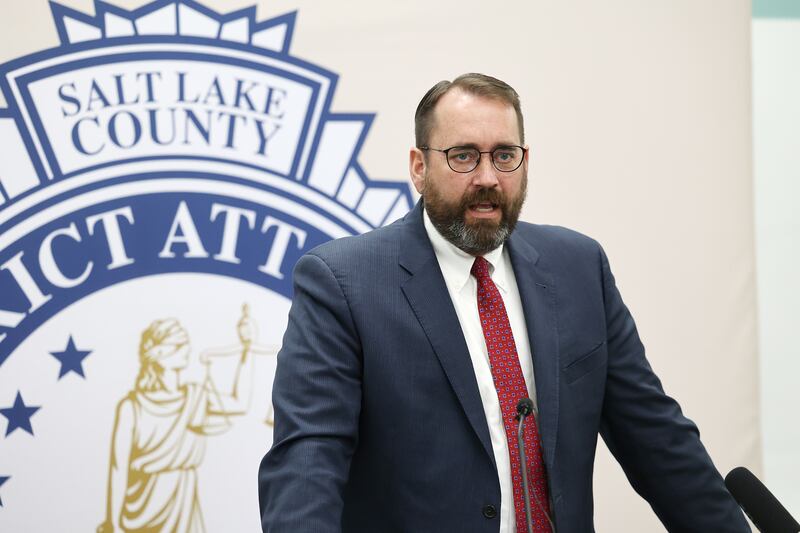Utah County Attorney David Leavitt has announced he’ll no longer seek the death penalty.
That includes in an ongoing case against a man accused of slitting the throats of a young couple and dumping their bound bodies in an abandoned mine shaft in 2017 — a reversal from his 2019 decision to seek the death penalty against the man, Jerrod William Baum. Today, that case continues to play out in Utah courts. Baum has pleaded not guilty.
Leavitt made the announcement in a video recorded statement that was released Wednesday morning, hours after news broke that a pair of Republican lawmakers planned to sponsor legislation in the Utah Legislature’s upcoming 2022 general session to repeal and replace Utah’s capital punishment statute.
Though Leavitt didn’t name the Baum case explicitly in his video statement, his office filed a motion Wednesday in 4th District Court to withdraw the state’s intent to seek the death penalty for both counts of capital murder Baum is charged with.
The families of Riley Powell, 18, and Brelynne “Breezy” Otteson, 17 — the two victims who were bound, gagged, had their throats slashed and their bodies tossed down the Tintic Standard Mine outside Eureka in Juab County in December 2017 — said Wednesday that they were “blindsided” by Leavitt’s announcement.
“We are heartbroken and speechless of the devastating news. This isn’t just an injustice for Breezy and Riley. This is an injustice for Utah County as a whole,” the families wrote in a statement posted on the Facebook page titled “Justice for Breezy and Riley.”
“By removing the death penalty as a consequence to one’s actions only tells other criminals there is no recourse for their actions other than they will be housed, fed, and they will continue to be able to live their life, something Breezy and Riley didn’t get a choice of,” the young couple’s families wrote.
Leavitt’s reasoning, spelled out in the video circulated by his office, is the same as the lawmakers championing the legislation, Rep. Lowry Snow, R-St. George, and Sen. Dan McCay, R-Riverton: Its financial tolls on taxpayers and emotional tolls on victims’ families are too high.
“The reality in any death penalty case is that even if a jury were to deliver a verdict of death, my 30 years as a criminal justice lawyer convinced me that the death penalty will never be carried out again in this state, nor should it,” Leavitt said. “It’s time to change course. There’s a better route, and we’re going to seek it.
“There is no shame in admitting the need to change once we become aware of it,” Leavitt added. “The only shame is if we choose to shrink from the challenge to move forward.”
Leavitt cited two high-profile death penalty cases in Utah that had two very different outcomes, but resulted in fame and notoriety for both killers.
“One resulted in a speedy execution,” Leavitt said, pointing to the 1977 execution of Gary Gilmore after he was convicted of murdering two young Utah County men: motel manager Ben Bushnell and gas station attendant Max Jensen.
Gilmore’s execution was carried out three months after his two-day trial, garnering national headlines. After being sentenced to die, Gilmore thwarted attempts by his attorneys to appeal the case and chose to be executed by firing squad. His famous final words were: “Let’s do it.”
“I was 13 years old and remember the notoriety that Gary Gilmore received from his death sentence,” Leavitt said. “Eight years later, another heinous crime destroyed innocent lives and rocked Utah County’s psyche.”
Leavitt then cited the brutal case of Ron and Dan Lafferty, who were convicted in a murder that remains one of Utah’s most infamous. Claiming a revelation from God, the brothers slashed the throats of Brenda Lafferty and her 15-month-old daughter, Erica, nearly decapitating the toddler, in their American Fork home on July 24, 1984.
While Dan Lafferty was sentenced to life without possibility of parole, Ron Lafferty was sentenced to die — but he remained on death row for 35 years as his case and its appeals process dragged. He was never executed but died of natural causes in 2019.
“During that time, his case gained so much notoriety that he was known throughout the world,” Leavitt said. “Dan Lafferty, on the other hand, still resides at the Utah State Prison. He is not famous. In fact, the world does not remember him.”
Now, Leavitt is reversing course for the Baum case. The move to seek the death penalty for Baum is one Baum’s attorneys have fought tooth and nail. Last year, Baum’s defense attorneys accused Leavitt of violating a gag order and asked a judge to find him in contempt. The judge declined.
Leavitt said he knew the decision to pursue the death penalty in Baum’s case would lead to an extraordinary burden on taxpayer resources, “not the mention the cost of decadeslong appeals process if the defendant was found guilty.” The decision also made him the first Utah County attorney since 1984 to seek the death penalty.
“That decision has required an enormous expenditure of resources, both in time and taxpayer dollars,” Leavitt said. “All of what was spent, and more would be worth it if it would prevent another senseless murder from occurring, but doesn’t and it won’t.”
“Pretending that the death penalty will somehow curb crime is simply a lie,” Leavitt continued. “The answer to preventing these types of horrible crimes is in education and prevention, before they occur. No family wants to hear, ‘My child is dead, and that man got a long sentence.’ What they want to hear is, ‘My child was never killed.’”
Since deciding to seek the death penalty, Leavitt said he’s learned, “regardless of the crime, seeking the death penalty does not promote our safety.”
“Seeking the death penalty seemed the right decision at the time, but upon further reflection, I am convinced that its costs far outweigh its benefits to the community as a whole,” Leavitt said.
The death penalty, Leavitt said, is not an “effective deterrent. It simply demonstrates our societal preference for retribution over public safety.”


 alt=Katie McKellar
alt=Katie McKellar